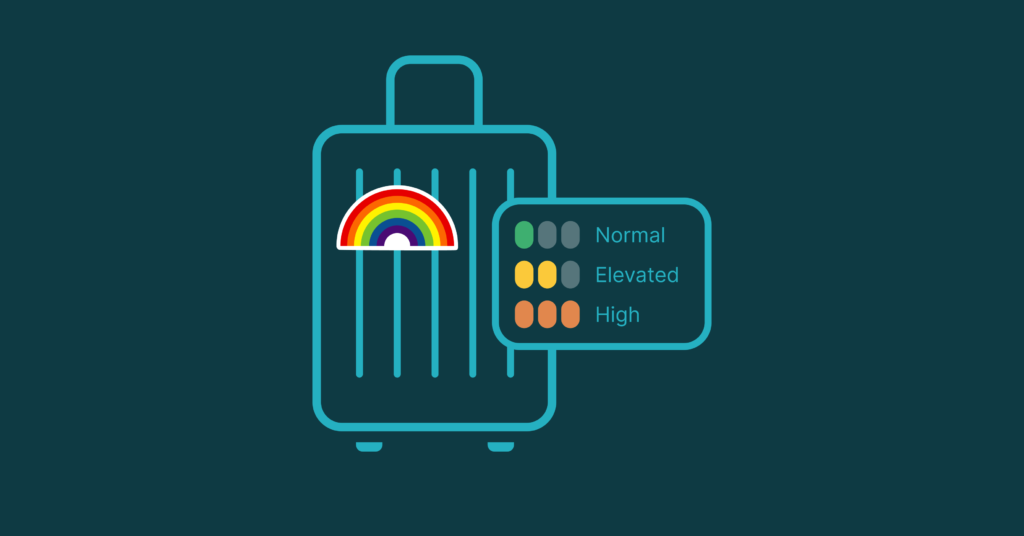LGBTQ inclusivity in travel is essential to ensuring that everyone can explore new places without fear of discrimination. Progressive countries such as Thailand, Germany, Greece, Japan, Australia and New Zealand are generally considered safe and welcoming for the LGBTQ community. However, travellers may be confronted with difficulties in many other destinations.
Despite efforts in recent years to improve corporate travel policies addressing LGBTQ security, travellers still face safety issues, especially in the 64 countries where homosexuality is criminalised. These obstacles range from legal uncertainties to varying levels of social acceptance.
An SAP Concur Global Business Travel Survey revealed that 82% of LGBTQ business travellers changed their accommodation in 2022 and 2023 due to safety concerns.
Our updated LGBTQ travel safety data provides comprehensive information for travellers across 233 destinations, outlining the challenges they may encounter. It offers insights into legal rights, social attitudes and LGBTQ-friendly areas, along with practical advice for navigating potential risks.
Our Travel Intelligence Team Lead, Claudia Gualdi, emphasises that even in safe destinations, barriers remain for LGBTQ individuals: “It’s important to differentiate between the experiences of travellers and those living in these countries. While many destinations are supportive and inclusive, local communities may still face difficulties. Understanding these nuances helps create a more informed and respectful travel experience.”
LGBTQ Travel Safety Data: Understanding Our Methodology
Our LGBTQ travel safety data is designed to assist travel management companies, travel technology firms and security organisations in enabling safer trips for travellers. It is included in our products as short texts or concise data points.
This data combines human expertise with open-source information to ensure accuracy and reliability. Our travel data analysts gather and verify information from trusted sources such as ILGA World, Equaldex and relevant NGOs upholding LGBTQ rights.
A country’s LGBTQ risk level is defined on different criteria, including:
- Legal status of homosexuality: Whether homosexuality is legal, illegal or partially criminalised.
- Rights of transgender individuals: The ability to legally change gender on official documents.
- Same-sex marriage and civil unions: Recognition of these unions and any existing legal barriers.
- Social acceptance: Attitudes towards LGBTQ individuals, from acceptance to discrimination.
- Passport entry regulations: Recognition of gender-neutral passports (Passport X) and the safety of travelling with them.
Using this methodology, we divide destinations into three categories: normal, elevated or high level of concern.
“High-concern destinations are those where travellers are more likely to face unwanted attention and legal issues. For example, places where transgender travellers should update their passports to reflect their current gender to avoid complications. Similarly, same-sex couples may face problems in certain countries. Therefore, booking accommodation with separate rooms or beds may be advisable, depending on local customs and laws,” explains Claudia Gualdi.
The Importance of LGBTQ Travel Safety Data
Access to detailed LGBTQ data significantly enhances travel planning by helping people navigate potential challenges and risks. Understanding a country’s legal stance on same-sex marriage or gender X passport acceptance influences decisions regarding destinations, accommodation and transportation. Additionally, awareness of the political and social context ensures a more comfortable and secure travel experience.
“Travellers should be familiar with local customs and social behaviours to navigate different environments effectively. For instance, in some countries, it may be advisable to avoid public displays of affection or discussions about LGBTQ issues with strangers. Non-binary individuals should also be aware that accessing certain spaces or services might require them to select either male or female options”, highlights our Travel Intelligence Team Lead.
5 Recommendations For Your LGBTQ Travellers
Here are five recommendations from our Travel Team to assist travel management companies, technology firms and security organisations in planning safer and more inclusive trips for LGBTQ travellers:
1. Access reliable information
Always consult trusted sources like LGBTQ advocacy organisations, travel guides and community forums, such as ILGA Europe and Amnesty International. These resources provide up-to-date information and valuable insights on different destinations.
2. Check passport requirements
For non-binary travellers with gender X passports, it’s crucial to research the destination’s policy. While some progressive countries recognise such passports, many do not. We recommend verifying it beforehand to avoid complications.
3. Understand legal frameworks
Investigate the legal status of LGBTQ rights at the destination. This includes whether the country recognises same-sex marriage or civil unions and the rights of transgender individuals, such as the ability to change gender on official documents. This information can impact accommodation, transportation and overall travel safety.
4. Assess social acceptance
Being aware of local social attitudes towards LGBTQ individuals is as important as understanding the legal framework. Research the cultural norms and levels of social acceptance in the country. In some places, discretion in public displays of affection or discussions about LGBTQ topics may be advisable for safety.
5. Prepare for specific travel needs
Certain services or spaces may require non-binary or transgender travellers to select either male or female. It is important to plan ahead and be aware of these limitations. Additionally, knowing which areas are LGBTQ-friendly can help avoid any unwelcome situations.
By following these recommendations, organisations can ensure a safer, more inclusive experience for their LGBTQ travellers, supporting them every step of the way.
